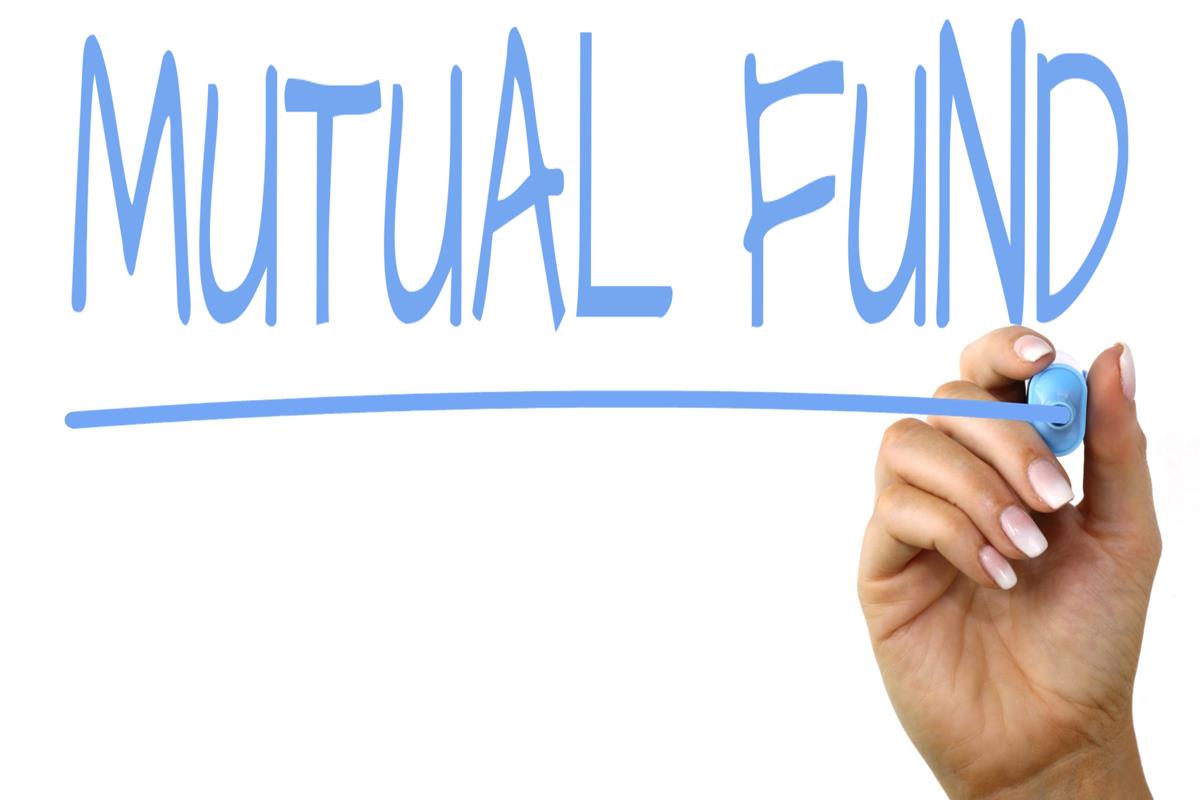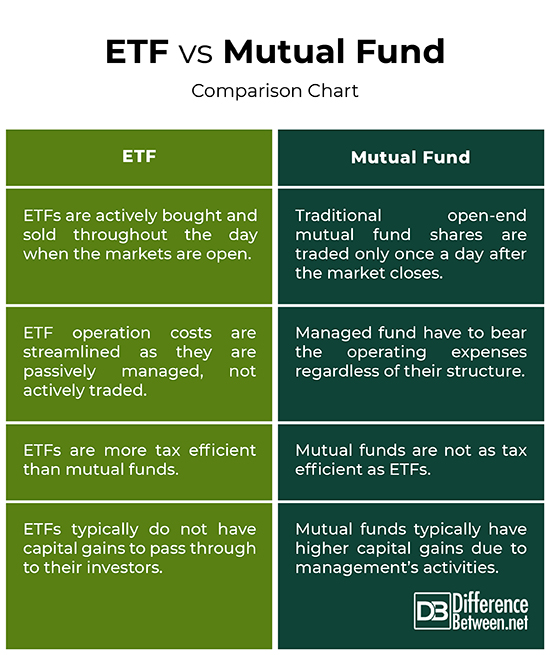Difference Between Tax ETF and Mutual Fund
Investors face an array of choices when it comes to investing their money from traditional investments such as stocks, bonds and cash to various alternative investments. There’s one product out there which is definitely worth looking at. This product is more of a cross between an index managed fund and a stock, and is called an exchange traded fund, or ETF. But, which one is more tax efficient – ETF or mutual fund?

What is Exchange Tax Fund (ETF)
From their fledgling beginnings in 1993 to a full-blown revolution in the mutual fund industry, ETFs have grown exponentially in the last few years, and they continue to grow and gain influence. ETFs are smart, cheap and tax-smart. But what exactly are they and how does that work? An ETF is a type of fund that can be traded on an exchange like a stock, meaning they can be traded intraday on stock exchanges at market determined prices. Like shares of any publicly traded company, investors can buy or sell ETF shares through a broker. They combine the features and benefits of mutual funds, stocks or bonds.

What is Mutual Fund?
Mutual funds are often the simplest and least expensive way to gain access to different markets and securities. Like ETFs, mutual funds are based on the pooled investment concept and adhere to the passive, indexed strategy. They pool money from various investors and invest the money in securities such as stocks and bonds. It is a professionally managed investment scheme, typically run by an asset management company that take the money from investors and invest them in securities. The shareholders may experience savings because they share the costs and benefits from economies of scale, allowing for lower trading costs per dollar of investment.
Difference between Tax ETF and Mutual Fund
Trading Flexibility
– Traditional open-end mutual fund shares are traded only once a day after the market closes. Trading is done with the mutual fund company that issues the shares and investors have to wait till the end of the day. ETFs, on the other hand, are actively bought and sold throughout the day when the markets are open, providing greater flexibility to the investors. The pricing of ETF shares is continuous during normal exchange hours.
Tax Benefits
– Compared to traditional mutual funds, ETFs can be more tax efficient because their structure is different enough that almost every ETF is more transparent and more flexible. ETFs typically do not have capital gains to pass through to their investors and because of low turnover, they have fewer taxable gains. The creation and redemption process allowed most of the unrealized capital gains within ETFs to be erased. However, ETFs are required to distribute all dividends and interest to shareholders, which are taxable at a rate according to the type of income it is.
Cost Efficiency
– Managed fund have to bear the operating expenses regardless of their structure, which include portfolio management fees, administrative expenses, custody costs, marketing expenses and distribution. ETF operation costs are streamlined as they are passively managed, not actively traded. All the fees and expenses incurred by ETFs are the expenses that mutual funds also pay. There are just fewer of them. The average expense ratio is less than the expense ratio for mutual funds.
ETF vs. Mutual Fund: Comparison Chart

Summary
Mutual funds are often the simplest and least expensive way to gain access to different markets and securities, but ETFs are considered slightly more tax efficient than mutual funds because they do not have capital gains to pass on to their investors, unlike mutual funds, which typically have higher capital gains. Like ETFs, mutual funds are based on the pooled investment concept and adhere to the passive, indexed strategy, but ETFs provide easy access to broad spheres of the market, which kind of explain the rising popularity of ETFs.
Are mutual funds or ETFs more tax efficient?
ETFs are usually more tax efficient than mutual funds because ETFs have their own distinctive structure for buying and selling, and they typically do not have capital gains to pass on to their investors, due to the creation and redemption mechanism.
Is a mutual fund or ETF better?
ETFs do have several advantages over mutual funds beyond just tax benefits. First, ETFs are cheaper than mutual funds and they have lower expenses in the area of monthly statements. ETFs are more flexible and transparent.
What is the tax advantage of an ETF over mutual funds?
ETFs have their own buying and selling mechanism and they have fewer taxable gains because of low turnover. Also, the majority of ETFs are passively managed so they create fewer transactions.
What are the disadvantages of ETFs?
Trading costs can go up for investors who have traditionally invested in no-load funds directly with the fund company and pay no commissions. And at any given time, the spread on an ETF may be high and the market price of shares might not correspond to the intraday value of the underlying securities.
Are ETFs good for beginners?
Because of the many benefits and the rising popularity of the ETFs compared to traditional mutual funds, they are a very good investment option, especially for beginners. The many benefits include low expense ratios, liquidity, transparency, diversification, tax benefits, and so on.
Which ETF does Warren Buffett recommend?
Warren Buffett recommends the Vanguard FTSE All-World ex-US Small-Cap ETF, a fund that seeks to track the performance of a benchmark index that consists of more than 3,000 stocks in over a dozen nations.
Can ETFs make you rich?
ETFs are one of the hottest products on Wall Street. Over time, ETFs have become incredibly popular investment schemes for both active and passive investors alike. Although, ETFs can definitely make you rich, they are not without their fair share of pros and cons either.
- Difference Between Caucus and Primary - June 18, 2024
- Difference Between PPO and POS - May 30, 2024
- Difference Between RFID and NFC - May 28, 2024
Search DifferenceBetween.net :
Leave a Response
References :
[0]Davidson, Colin and Russell Wild. Exchange-Traded Funds For Dummies. New Jersey, United States: John Wiley & Sons, 2011. Print
[1]Ferri, Richard A. The ETF Book: All You Need to Know About Exchange-Traded Funds. New Jersey, United States: John Wiley & Sons, 2011. Print
[2]Filbeck, Greg, et al. Mutual Funds and Exchange-Traded Funds: Building Blocks to Wealth. Oxford, United Kingdom: Oxford University Press, 2015. Print
[3]Carrel, Lawrence. ETFs for the Long Run: What They Are, How They Work, and Simple Strategies for Successful Long-Term Investing. New Jersey, United States: John Wiley & Sons, 2008. Print
[4]Image credit: https://www.thebluediamondgallery.com/handwriting/images/mutual-fund.jpg
[5]Image credit: https://techbullion.com/wp-content/uploads/2021/04/asset-allocation-charts-md.jpg
